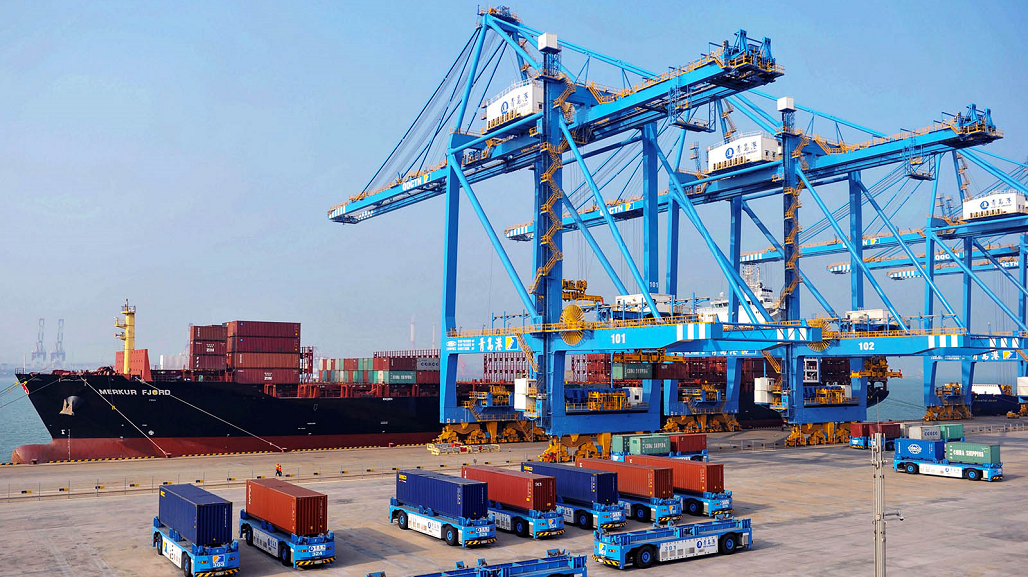Photo: STR/AFP via Getty Images
Trucks transferring containers at an automated cargo wharf in Qingdao, China. “Trade is a really important tool to deliver technologies that have a massive impact on the quality of life.”
 2020 was rough — but it’s not all doom and gloom. Is the world better off than we think?
2020 was rough — but it’s not all doom and gloom. Is the world better off than we think?
Good news has been in short supply. From the devastation of the COVID-19 pandemic to racial violence and political polarization, it seems like the world is taking a global gut-punch. But is humanity overall still on the up-and-up, despite the massive challenges?
Charles Kenny, director of technology and development and senior fellow at the Center for Global Development, joins the Altamar podcast team of Peter Schechter and Muni Jensen to explain why the doom-mongers are wrong. His current work focuses on gender and the role of technology in development, governance and anticorruption. He is the author of numerous books on improving the world, and his latest, The Plague Cycle, explores humankind’s struggles with infectious disease.
Getting Back on Track
Kenny is “broadly optimistic” for 2021, for which the OECD forecasts 4.2% global growth. “I think the vaccine will spread … global trade looks like it’s bouncing back,” says Kenny. Optimism should be tempered by patience for the vaccine roll-out, and mounting debt issues in developing nations, he says, but “there are reasons to think that we can get back on track reasonably fast.”
Zooming out, things look even better.
The last 50 years have seen a historic fivefold increase in GDP per capita in the world, while global social indicators have moved in the right direction. As countries recover from the pandemic shock, according to Kenny “a lot of the forces that are undergirding longer-term progress, like other health technologies, expanded education and policy progress, are getting back on track.”
In some ways, he says, COVID-19 demonstrates how quickly the world was improving: “This huge global pandemic temporarily reversed just three or four years of worldwide progress against extreme poverty reduction, for example.”
Health Offers a Way to Cooperate
The coronavirus crisis would also have been even more painful at another point in world history. Indeed, highly effective vaccines and testing for COVID-19 have been developed at record speed. “We’re incredibly lucky to be facing COVID with the technology and knowledge we have today,” says Kenny. As he points out, “We wouldn’t have recognized COVID as a new disease for the vast majority of human history, just because so many people were dying of infection and respiratory diseases every year.”
While global cooperation is at a low point compared to previous decades, Kenny is also optimistic that the world can band together. “If you look at some of the earliest global international agreements, they were around global public health issues,” he argues.
According to Kenny, “COVID has rammed home how much we live in a global disease pool and how much we have to work together. … Maybe a silver lining out of this will be a renaissance in international cooperation more widely.”
Climate Is Fixable
One clear area where nations must work together is in combating the climate crisis. According to Kenny, “We haven’t come together in the way we should to deal with it. In some ways, we’ve gone backward.”
Nevertheless, he believes that climate change is an “eminently fixable problem.” Kenny points to a recent IMF paper suggesting that it would cost just 1% of global GDP to stay below two degrees warming: “Now that’s a low estimate compared to others that range up to 6%, but even at 6%, it’s a massively good deal.”
Kenny is also hopeful that globalization and worldwide trade will keep serving as catalysts for progress. “I’m hugely in favor of the spread of … norms of behavior through international agreements,” he says. “Trade is a really important tool to deliver technologies that have a massive impact on the quality of life.”
For this reason, Kenny argues that the world needs “standards that protect rights in developing countries, but that don’t stifle the opportunity created by trade agreements.”
But isn’t technology a double-edged sword? Kenny argues that it comes down to guardrails. “We need to be updating the laws and institutions to make sure they keep up with our technology. … We need rules for data. … We need global rules for privacy that work,” he says.
But according to Kenny, “While I do accept there are downsides to technological advances, they are downsides that we know how to deal with, and we just need to get on and deal with them because their upside potential is so huge.”
Altamar is a global politics podcast hosted by former Atlantic Council senior vice president Peter Schechter and award-winning journalist Muni Jensen. Subscribe to the Altamar podcast on: Apple, Spotify, or Google.
Related themes: Climate Change Risk Mitigation Trade
 Charles Kenny
Charles Kenny
Director of Technology and Development at Center for Global Development@charlesjkenny
Charles Kenny is the director of technology and development and senior fellow at the Center for Global Development. His current work focuses on gender and development, the role of technology in development, governance and anticorruption and the post-2015 development agenda.
The original article can be read at the Brinks’ website HERE.


Leave a Reply